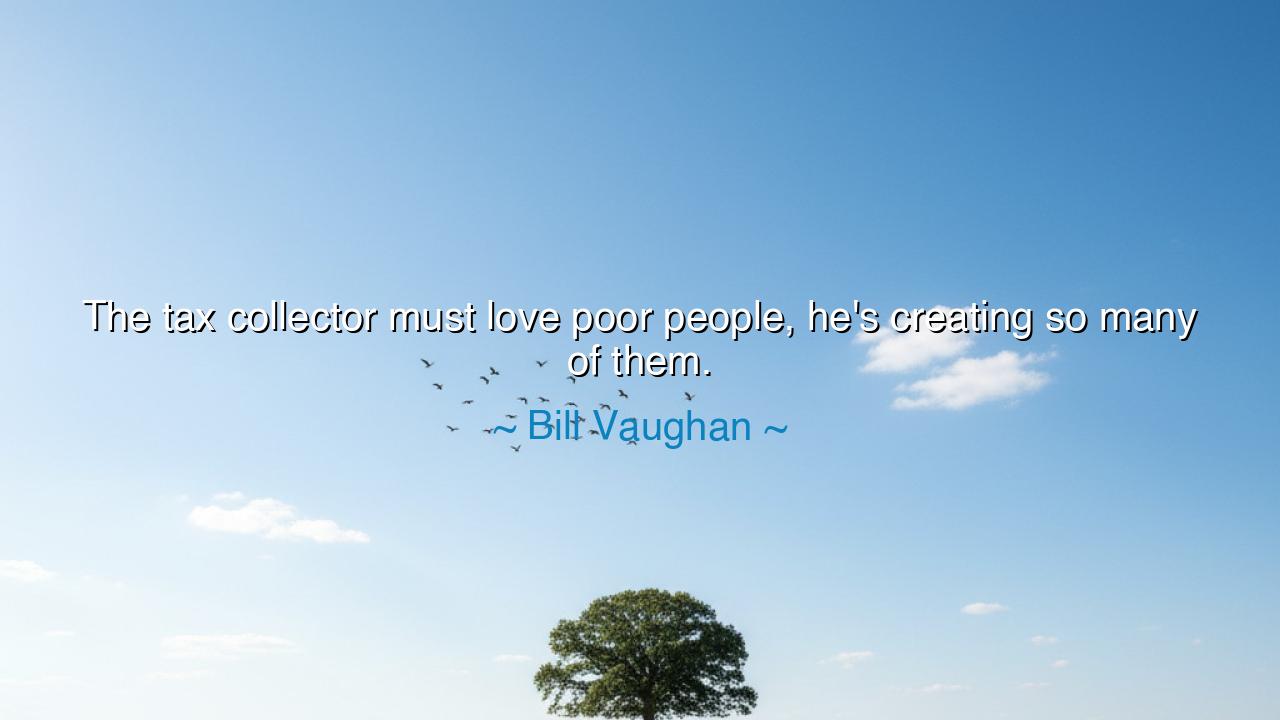
The tax collector must love poor people, he's creating so many of






In the age of modern satire, when truth found refuge in laughter, the American humorist Bill Vaughan spoke a line that pierced both the heart and the purse of humanity: “The tax collector must love poor people, he’s creating so many of them.” Beneath its wit lies a lament as old as civilization itself — the struggle between those who labor and those who levy, between the makers of bread and the keepers of coin. Vaughan’s jest, though light to the ear, is heavy with history. It is the cry of every generation that has watched the sweat of the many turned into the treasure of the few.
The tax collector, in the ancient world, was a figure both feared and despised — the visible hand of invisible power. In Rome, he was the publicanus, whose greed was legendary. He took not only what the law required, but what his conscience allowed — and often, that was everything. In the words of the Gospels, even the followers of truth and mercy looked upon tax collectors as sinners. For they did not create wealth; they extracted it. Vaughan’s humor, then, is not mere cynicism — it is prophecy. He shows us that when the hands of authority grow too fond of collection, the spirit of poverty multiplies faster than the fruits of labor. Oppression, when disguised as duty, becomes the most dangerous of tyrants.
Consider the tale of Jean-Baptiste Colbert, the finance minister of King Louis XIV. When he was asked how much a government might rightfully take from its people, he answered: “The art of taxation consists in plucking the goose so as to obtain the largest amount of feathers with the least possible hissing.” Thus was born the philosophy of quiet exploitation — the idea that the governed should pay not to sustain justice, but to preserve silence. The peasantry of France endured such plucking for generations, until at last, in 1789, they rose in fire and fury. Their cry was simple: “Enough.” From their ashes came the Revolution — a storm that swept away kings and taxmen alike. Vaughan’s jest, then, echoes their warning: when the burden becomes unbearable, laughter turns to revolt.
Yet in his irony there is not only condemnation, but compassion. For Vaughan knew that poverty is not merely the absence of wealth, but the presence of injustice. When those who hold power forget the sacred purpose of governance — to nurture, not to consume — they drain not only pockets but spirits. And so, the poor are not merely created by the lack of money, but by the loss of fairness. The tax collector, whether ancient or modern, becomes a symbol of imbalance — of systems that enrich themselves while pretending to serve. The humorist’s laughter, then, is not mockery of the poor, but a defense of their dignity.
There is wisdom to be found, too, in remembering that not all collection is corruption. A just tax is the price of civilization — the offering by which communities build roads, schools, and safety for all. The danger arises when the balance tilts, when those who give are crushed by the giving, and those who receive grow drunk on their taking. Vaughan’s line warns us that the measure of justice in any nation lies in how it gathers and how it gives. If the harvest of the humble feeds the luxury of the proud, then the nation itself has lost its soul.
The story of Robin Hood, though mythic, endures because it carries this eternal truth. The sheriffs and taxmen of Nottingham, swollen with greed, forgot the people they were meant to serve. In response, the outlaw arose — not as a thief, but as a symbol of balance restored. Robin’s arrows, aimed at tyranny, fly through time to remind us that justice cannot be purchased by exploitation. Vaughan’s humor, like Robin’s rebellion, strikes not from hatred but from hope — that someday, systems might learn mercy, and power might learn humility.
Therefore, O listener, take this jest as counsel: beware of the tax collector within and without. In your own soul, do not pluck the goose of joy in the name of order; do not drain others for your gain. Demand justice, but also compassion. Support what builds, resist what bleeds. And when laughter arises at the expense of power, let it be the laughter of awakening — the kind that lights the path from poverty toward dignity.
For in the end, Vaughan’s wisdom is this: every society must choose between two loves — the love of wealth or the love of people. The first multiplies poverty; the second heals it. Let us then build a world where laughter need not defend the poor, because justice already does — a world where the collector’s hand no longer creates the misery it claims to relieve, and where the riches of a nation are measured not in gold, but in the well-being of its people.






AAdministratorAdministrator
Welcome, honored guests. Please leave a comment, we will respond soon